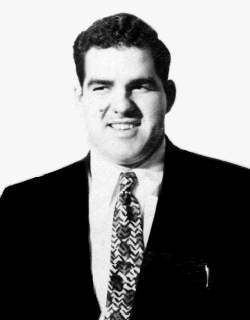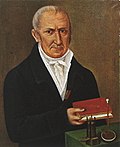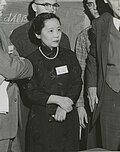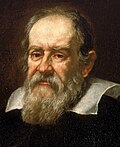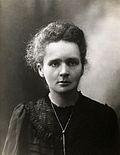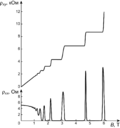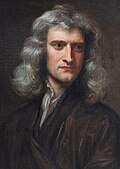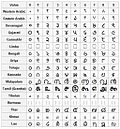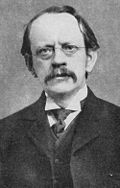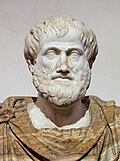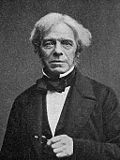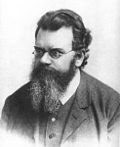Portal:Physics
The Physics Portal


Physics is the scientific study of matter, its fundamental constituents, its motion and behavior through space and time, and the related entities of energy and force. It is one of the most fundamental scientific disciplines. A scientist who specializes in the field of physics is called a physicist.
Physics is one of the oldest academic disciplines. Over much of the past two millennia, physics, chemistry, biology, and certain branches of mathematics were a part of natural philosophy, but during the Scientific Revolution in the 17th century, these natural sciences branched into separate research endeavors. Physics intersects with many interdisciplinary areas of research, such as biophysics and quantum chemistry, and the boundaries of physics are not rigidly defined. New ideas in physics often explain the fundamental mechanisms studied by other sciences and suggest new avenues of research in these and other academic disciplines such as mathematics and philosophy.
Advances in physics often enable new technologies. For example, advances in the understanding of electromagnetism, solid-state physics, and nuclear physics led directly to the development of technologies that have transformed modern society, such as television, computers, domestic appliances, and nuclear weapons; advances in thermodynamics led to the development of industrialization; and advances in mechanics inspired the development of calculus. (Full article...)
Sir James Chadwick (20 October 1891 – 24 July 1974) was an English nuclear physicist who received the Nobel Prize in Physics in 1935 for his discovery of the neutron. In 1941, he wrote the final draft of the MAUD Report, which inspired the U.S. government to begin serious atom bomb research efforts. He was the head of the British team that worked on the Manhattan Project during World War II. He was knighted in Britain in 1945 for his achievements in physics.
Chadwick graduated from the Victoria University of Manchester in 1911, where he studied under Ernest Rutherford (known as the "father of nuclear physics"). At Manchester, he continued to study under Rutherford until he was awarded his MSc in 1913. The same year, Chadwick was awarded an 1851 Research Fellowship from the Royal Commission for the Exhibition of 1851. He elected to study beta radiation under Hans Geiger in Berlin. Using Geiger's recently developed Geiger counter, Chadwick was able to demonstrate that beta radiation produced a continuous spectrum, and not discrete lines as had been thought. Still in Germany when World War I broke out in Europe, he spent the next four years in the Ruhleben internment camp. (Full article...)
Did you know -

- ... that, in the Large Hadron Collider, protons move at 99.9999991% the speed of light when accelerated with the energy of 7 TeV?
- ... that, at a speed of 299,792,458 m/s, light can travel from the Earth to the Moon in 1.2 seconds?
Selected image -

Astrophysics is a science that employs the methods and principles of physics and chemistry in the study of astronomical objects and phenomena. As one of the founders of the discipline, James Keeler, said, astrophysics "seeks to ascertain the nature of the heavenly bodies, rather than their positions or motions in space—what they are, rather than where they are", which is studied in celestial mechanics. (Full article...)
Related portals
May anniversaries
- May 1, 1960 - U-2 spy plane shot down
- May 6, 1937 - Hindenburg fire
- May 9, 1012 BC – Solar Eclipse seen at Ugarit, 6:09–6:39 PM.
- May 9, 1904 – City of Truro, a steam locomotive exceeds 100 mph (160 km/h).
- May 10, 1946 – V-2 rocket's first successful launch at White Sands Proving Ground
- May 10, 1960 – The nuclear submarine USS Triton completes Operation Sandblast, the first underwater circumnavigation of the earth.
- May 11, 1862 – American Civil War: The ironclad CSS Virginia is scuttled in Virginia.
- May 11, 1995 – In New York City, over 170 countries extend Nuclear Nonproliferation Treaty indefinitely, without conditions.
- May 11, 1998 – India conducts three underground nuclear tests, including a thermonuclear device.
- May 14, 2018 - Ennackal Chandy George Sudarshan died.
- May 16, 1960 - Theodore Maiman operates the first optical laser, at Hughes Research Laboratories in Malibu, California.
- May 16, 1969 – Venera 5, a Soviet spaceprobe, lands on Venus.
- May 17, 1865 – The International Telegraph Union is established.
- May 18, 1974 - India conducts underground nuclear tests, named Smiling Buddha.
- May 18, 1998 - Microsoft sued by US Government
- May 19, 1943 - RAF uses bouncing bombs in combat
- May 20, 1932 - Amelia Earhart crosses Atlantic Ocean
- May 26, 1972 - President Nixon and Leonid Brezhnev sign nuclear weapon non-proliferation pact.
- May 24, 1844 - First official telegraph message is sent by Samuel Morse.
- May 27, 1937 - Grand opening, Golden Gate Bridge
- May 28, 1998 – Pakistan conducts five underground nuclear tests, named Chagai-I.
Births
- May 6, 1872 - Willem de Sitter, physicist, mathematician, and astronomer
- May 9, 1931 – Vance Brand, astronaut
- May 10, 1746 – Gaspard Monge, mathematician
- May 10, 1788 – Augustin-Jean Fresnel physicist
- May 10, 1963 – Lisa Nowak, astronaut
- May 11, 1918 – Richard Feynman, physicist
- May 14, 1686 - Gabriel Fahrenheit, physicist and engineer
- May 21, 1921 - Andrei Sakharov, nuclear physicist
Deaths
- May 10, 1482 – Paolo dal Pozzo Toscanelli, mathematician and astronomer
- May 16, 1830 – Joseph Fourier, French scientist
- May 17, 1916 – Boris Borisovich Galitzine, Russian physicist
General images
Categories

Fundamentals: Concepts in physics | Constants | Physical quantities | Units of measure | Mass | Length | Time | Space | Energy | Matter | Force | Gravity | Electricity | Magnetism | Waves
Basic physics: Mechanics | Electromagnetism | Statistical mechanics | Thermodynamics | Quantum mechanics | Theory of relativity | Optics | Acoustics
Specific fields: Acoustics | Astrophysics | Atomic physics | Molecular physics | Optical physics | Computational physics | Condensed matter physics | Nuclear physics | Particle physics | Plasma physics
Tools: Detectors | Interferometry | Measurement | Radiometry | Spectroscopy | Transducers
Background: Physicists | History of physics | Philosophy of physics | Physics education | Physics journals | Physics organizations
Other: Physics in fiction | Physics lists | Physics software | Physics stubs
Physics topics
Classical physics traditionally includes the fields of mechanics, optics, electricity, magnetism, acoustics and thermodynamics. The term Modern physics is normally used for fields which rely heavily on quantum theory, including quantum mechanics, atomic physics, nuclear physics, particle physics and condensed matter physics. General and special relativity are usually considered to be part of modern physics as well.
More recognized content
Associated Wikimedia
The following Wikimedia Foundation sister projects provide more on this subject:
-
Commons
Free media repository -
Wikibooks
Free textbooks and manuals -
Wikidata
Free knowledge base -
Wikinews
Free-content news -
Wikiquote
Collection of quotations -
Wikisource
Free-content library -
Wikiversity
Free learning tools -
Wikivoyage
Free travel guide -
Wiktionary
Dictionary and thesaurus
Sources
Portals on Wikipedia












